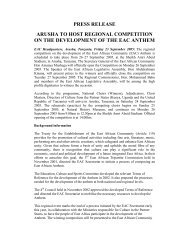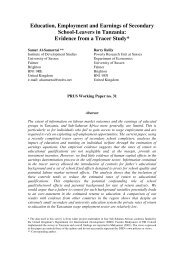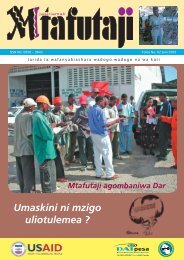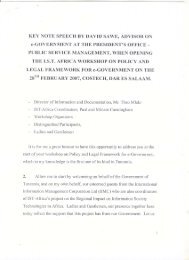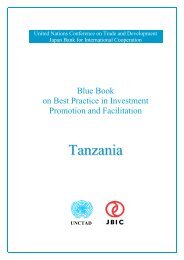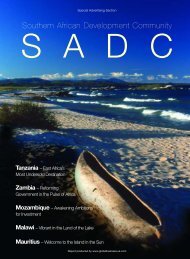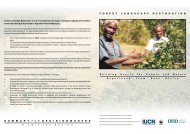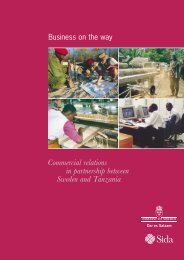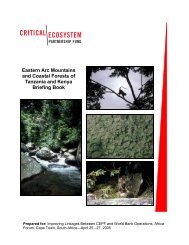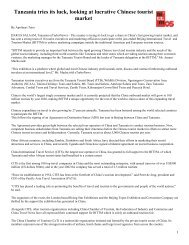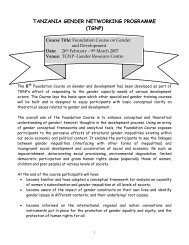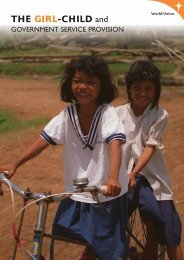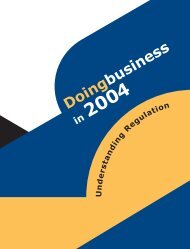Designing e-Government for the Poor - Tanzania Development ...
Designing e-Government for the Poor - Tanzania Development ...
Designing e-Government for the Poor - Tanzania Development ...
Create successful ePaper yourself
Turn your PDF publications into a flip-book with our unique Google optimized e-Paper software.
116<br />
Indonesia<br />
Title: E-learning in community access points (CAP) in assisting<br />
<strong>the</strong> learning process <strong>for</strong> students in rural area<br />
Proposer: Mr. Mohammad Rudy Salahuddin, Head, Sub-Directorate<br />
<strong>for</strong> Posts and ICT, National <strong>Development</strong> Planning Agency<br />
Country: Indonesia<br />
Date: March 2005<br />
I. INTRODUCTION<br />
The low level of ICT penetration in rural areas around Indonesia<br />
(0.2 per cent) is seen as <strong>the</strong> main obstacle to <strong>the</strong> development of <strong>the</strong><br />
In<strong>for</strong>mation Society. Initiatives based on <strong>the</strong> collaboration of <strong>the</strong> government,<br />
private sector, civil society and civil society groups have included<br />
numerous ef<strong>for</strong>ts to increase <strong>the</strong> above penetration level. Ef<strong>for</strong>ts have been<br />
arranged in both ways, creating <strong>the</strong> demand, i.e. creating an increased<br />
level of awareness through socialization activities, as well as, to some<br />
extent, creating <strong>the</strong> supply, i.e. providing some level of infrastructure<br />
availability – or at least creating pilot activities in making technology<br />
available.<br />
The World Summit on In<strong>for</strong>mation Society (WSIS) has set <strong>the</strong> target<br />
date of 2015 <strong>for</strong> half of <strong>the</strong> world’s population to have access to <strong>the</strong><br />
Internet. Indonesia through <strong>the</strong> commitments made in December 2003 has<br />
taken this commitment and is now conducting a number of initiatives to<br />
ensure that those targets are reached. WSIS recognizes Community Access<br />
Points (CAPs) as one of <strong>the</strong> solutions in providing access to <strong>the</strong> community.<br />
In this project, 200 CAP locations situated around schools will be<br />
selected. Collaborations will be made with teachers and lecturers to give<br />
assignments in traditional courses to students that ‘<strong>for</strong>ces’ <strong>the</strong>m to use <strong>the</strong><br />
e-learning facilities in <strong>the</strong> CAP location. Collaborations will also be made<br />
with <strong>the</strong> CAP sites so that certain e-learning tools can be installed and <strong>the</strong><br />
people managing <strong>the</strong> CAP sites can provide some assistance to students<br />
who use <strong>the</strong> facility.<br />
Students or learners which are identified include: junior and senior<br />
high schools students <strong>for</strong> curriculum-based units, junior and senior high<br />
school students <strong>for</strong> non-curriculum based activities, community decision<br />
makers, and rural development professionals.<br />
CAPs have been implemented in <strong>the</strong> past. However, implementing<br />
CAP in a controlled situation where conducive conditions are created to<br />
support effective e-learning programme in rural areas in Indonesia has not



